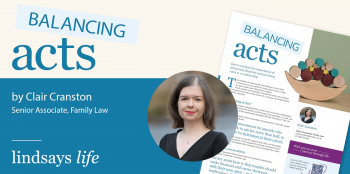One of the most common misconceptions surrounding divorce is that using a lawyer drags the process out and incurs more fees. The reality is, in most cases, very far from this. It is a solicitor’s job to progress matters as quickly as possible while ensuring that you end up with the best result in so far as the law will allow. It is in no-one’s best interests to enter into unnecessary protracted legal proceedings. In addition to the legal fees, it is important that people consider the emotional strain it could have. Separating from a spouse/partner and entering into divorce proceedings or carrying out negotiations is stressful and upsetting, not just for the parties involved but also for any children of the relationship. Often one party feels wronged by the other and heightened emotions can result in them being unwilling to been seen as “conceding” to a proposal made by their ex-partner.
Going to court to resolve financial issues or disputes regarding care of the children should be a last resort. In reality, although not the most romantic of notions, pre-nuptial agreements are the most effective way to protect parties’ assets. Parties enter into these agreements before the relationship breaks down and before emotions are intensified. Pre-nuptial agreements allow parties to control the division of their assets and arrangements for the care of the children.
Alternative methods of resolving outstanding issues are by negotiation, mediation or collaborative law. In most cases, negotiations will take place through the parties’ solicitors. If an agreement can be reached, a separation agreement can be entered into and signed by both parties. This separation agreement is a legally binding contract between the parties and should deal with all immediate and ongoing issues.
We are seeing more and more demand for collaborative law, which involves both parties retaining their own specially trained solicitors who will help them settle their case. Both clients and their respective solicitors attend a meeting with a view to reaching a negotiated agreement on all issues. Neither side may litigate against the other.
If none of these approaches work then the parties may have no option but to take the matter to court. Whilst going to court should be a last resort, it is sometimes a necessary one. Courts can order parties to disclose information relating to assets and, ultimately, a decision will be made regarding the division of assets and childcare arrangements.
A word of warning to everyone considering court action, however, is this – a decision will be made but there is no guarantee the decision will be in your favour. The Sheriff will consider both positions and may make a decision that neither party is particularly happy with. This could result in the household contents being valued and auctioned, the matrimonial home being sold, pensions being shared in addition to a range of other possibilities.
Although going to court sometimes is the only option, it is important that parties consider the effect it can have on them. Often people want their “day in court” without fully considering the impact it may have. At London High Court in July 2013, a judge begged a divorcing couple to resolve their differences after they spent more than £850,000 on legal fees!
Although understandable that a party who feels wronged by the other may wish to detail their ex partner’s wrong doings in open court, that should not be the purpose of raising a court action. Court is not intended to facilitate a mud-slinging match between two separated parties. Court is designed to resolve outstanding issues.
If you are considering separation or divorce, or if you have separated from your spouse or partner, please contact a member of our family law team who will be happy to discuss your options with you.








